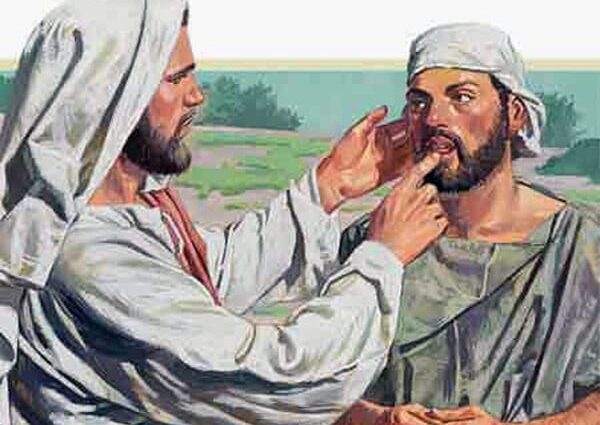Isaiah says in the first reading: “Be strong, fear not! Here is your God; he comes to save you!” Then he goes on to list the signs of God’s presence. The same signs that we see Jesus performing in the Gospel of Saint Mark. Jesus does the miracles in a specific way too. He uses concrete words and signs. For example, touching the man’s tongue and ears, commanding them to be open. Those words and signs then affect a change. They aren’t just for show but to heal and free the man from his physical limitations. Jesus’ gestures are “sacramental.” That is, they affect what they symbolize. They do what they say.
We still use the same word and symbols in the Sacrament of Baptism.
The priest or deacon touches the child’s ears and mouth with his thumb, saying: The Lord Jesus made the deaf hear and the dumb speak. May he soon touch your ears to receive his word, and your mouth to proclaim his faith, to the praise and glory of God the Father.
That’s part of our baptismal call. Our ears have been opened to hear the Word of God. That we might listen to God’s voice in the scriptures. In our prayers. In moments of adoration and Sacred Silence. Most especially in the liturgies and the Sacraments. We can’t just stop with hearing, though. We are supposed to proclaim that faith. That’s not always easy. We live in a world of instant information and communication. Somehow, it seems we are often more comfortable just remaining silent. When we are in a strange place or around people we don’t know well, many of us want to just get back to our comfort zone. But God tells us not to be afraid. “Here is your God!” He’s not in some distant, far away place, but right here! He’s by our side and with us wherever we go.
We then should be working to help all people from all backgrounds. That’s the exciting part about how we have this reading from James paired up with the Gospel. James talks about how we shouldn’t show partiality to anyone but treat everyone with dignity and respect. Then Jesus heals the deaf man. What do these two seemingly very different parts of Scripture have to do with each other? The key is in where the miracle occurs. The Gospel says: “Again Jesus left the district of Tyre and went by way of Sidon to the Sea of Galilee, into the district of the Decapolis.” The ten towns. This puts Jesus right in the middle of the Gentile territory. Jesus is healing the other, them, “those people,” the ones in the margins. The ones that no one else wants to talk to or about.
Jesus brings the Kingdom of God present to the people not in some far-off time and place but right there in that moment. We, too, should be working to free people wherever we are, whether at work or leisure. At home or in public. To release them from the earthly evils of hunger, illness, addiction, poverty, and oppression. But Jesus came to do something even more incredible, to free us from the gravest slavery known to man, sin. Sin is the root of all human bondage and the cause of all other injustices. That’s what the Sacraments are for, especially the one we gather for today around this altar.
In this place, the bread and wine are transformed into the body and blood, soul and divinity of our Lord, Jesus Christ. When our Priests stand at this altar speaking concrete words and showing us the signs of the Sacrament, it’s not just some theatrical performance or show. Jesus Christ is working through them to reveal to us the reality that God is here! It is here that heaven touches earth, bringing each of us together on even ground. It doesn’t matter who we are, how much money we have, where we grew up.. the Kingdom of God is made manifest right here around the Eucharistic feast. All are invited to this celebration, rich and poor alike! Jew and Gentile. Jesus Christ is saying to us again and again: Ephphatha! Be open! Prepare yourselves for worthy reception of Holy Communion. Receive me into your lives, into your bodies. By touching our tongue with His very Self, He frees us from the sins that bind us and inhibit us and gives us the courage and grace necessary to live the life we were created for.
Tomorrow/Monday is labor day. It reminds us that all people deserve safe environments, dignity, respect, a chance, and equal opportunity to work for life, liberty, and happiness. Jesus gives us the strength we need to make that happen. To take Him into the world, our jobs, our families, our communities… and to allow Him to reach them through us. Each of us has a duty and a responsibility to live up to that Baptismal call. It is an obligation to reach out to our fellow man using words or actions to remind them that God is right here! He wants to free us all from all those things that hold us back and prevent us from living the most fulfilling and complete life we can ever live, a Sacramental one.
A reflection on the readings for the 23rd Sunday in Ordinary Time: September 5th, 2021

